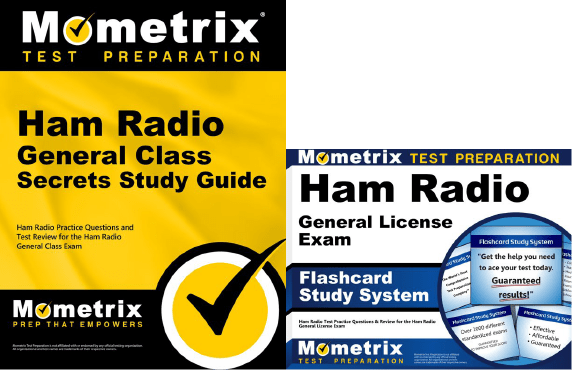If you need help studying for the Ham Radio General Class exam or just want some more information about what the exam is like, you’ve come to the right place.
Click below to take a free Ham Radio General Class practice test!
Exam Eligibility
Before you can register to take the Ham Radio General Class exam, you’ll need to take and pass the Technician Class exam. Then, once you pass the General Class exam, you’ll be set to take the Extra Class exam.
What’s on the Exam?
The General Class exam contains 35 multiple-choice questions, which are grouped into 10 sections. The questions in each section are pulled from a question pool, so each administration of the test contains a different set of questions.
There isn’t a set time limit, but it usually takes anywhere from 10 to 45 minutes to finish the exam.
Let’s take a closer look at the different sections.
1. COMMISSION RULES
5 questions
- Frequency privileges
- Primary and secondary allocations
- Good engineering
- Good amateur practice
- Prohibited transmissions
- Data emission standards
- Transmitter power regulations
- 60-meter operation requirements
- Volunteer examiners
- Volunteer examiner coordinators
- Remote operation
- ITU regions
- Third-party rules
2. OPERATING PROCEDURES
5 questions
- Phone operation procedures
- Transmitter setup for voice operation
- LSB/USB conventions
- RACES operation
- Band plans
- Operating effectively
- Drills and emergencies
- Q signals
- CW operating procedures
- CW procedural signals
- HF operations
- Volunteer Monitor Program
- Digital mode operating procedures
3. RADIO WAVE PROPAGATION
3 questions
- Sunspots
- Solar radiation
- Short-path and long-path propagation
- Maximum and minimum usable frequencies
- Ionospheric refraction
- Determining propagation conditions
4. AMATEUR PRACTICES
5 questions
- Station setup
- Test equipment
- Grounding and bonding
- Interference to consumer electronics
- S meters
- Speech processors
- Sideband operation near band edges
- Alternative energy source operation
- Mobile and portable HF stations
5. ELECTRICAL PRINCIPLES
3 questions
- Impedance
- Reactance
- Resonance
- Inductance
- Capacitance
- Electrical power calculations
6. CIRCUIT COMPONENTS
2 questions
- Solid-state diodes and transistors
- Batteries
- Resistors
- Rectifiers
- Capacitors
- Inductors
- Analog and digital integrated circuits
- RF connectors
7. PRACTICAL CIRCUITS
3 questions
- Power supplies
- Oscillators
- Amplifiers
- Filters
- Schematic symbols
- Digital signal processing
- Transceiver design
- Digital circuits
8. SIGNALS AND EMISSIONS
3 questions
- AM, FM, and single sideband
- Modulation envelope
- Intermodulation
- Digital emission modes
- Link budgets and margins
- Digital modulation
- Overmodulation
- Digital modulation
- Frequency changing
- Deviation
- Bandwidths of various modes
9. ANTENNAS AND FEED LINES
4 questions
- Basic dipole and monopole antennas
- Specialized antenna types and applications
- Characteristic impedance and attenuation
- Directional antennas
- Standing wave ratio calculation measurement, and effects
- Antenna feed point matching
10. SAFETY
2 questions
- Interlocks
- Electrical shock
- RF safety principles, guidelines, and rules
- Fusing
- Grounding
- Antenna and tower safety
- Routine station evaluation
- Wiring
How to Register
To get register, you’ll need to visit the ARRL® website to locate a testing session near you, which will provide you with the necessary contacts, time, and location of available testing appointments.
Before you can actually take the exam, you’ll also need to register with the FCC and get an FCC Registration Number (FRN).
Exam Scores
To get a passing score, you’ll need to get a score of at least 74%, which means you answered at least 26 questions correctly.
You should be given your final score report as soon as you finish the exam. When you pass, you become eligible to take the General Class exam.
Retaking the Exam
If you didn’t get a passing score on your first try, that’s okay! You can retake the test as many times as you need to, and you can even retake it on the same day as your first attempt.
Keep in mind that the questions you receive on retakes will be different than on your first attempt.
FAQs
How many questions are on the Ham Radio General Class exam?
The exam contains 35 questions.
What is the time limit for the Ham Radio General Class exam?
There isn’t a strict time limit, but it usually takes less than an hour to complete.
What is the passing score for the Ham Radio General Class exam?
You’ll need to get a final score of at least 74% to pass.
How much does the Ham Radio General Class exam cost?
The testing fee varies, but it usually costs around $15.
ARRL is a registered trademark of The American Radio Relay League, Inc., which is not affiliated with Mometrix Test Preparation and does not endorse this page.



 Ham Radio Study Guide
Ham Radio Study Guide Ham Radio Flashcards
Ham Radio Flashcards